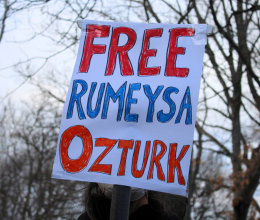
In what appears to be the first decision to address mandatory detention under the Laken Riley Act, a federal judge in Boston ruled today that detaining an individual solely on the basis of his prior arrest violates due process. Signed into law in January, the LRA purports to authorize immigration officers to jail people without any review over their detention and based solely on unproven accusations.
U.S. District Judge Indira Talwani ruled that jailing an 18-year-old without a bond hearing under the LRA violates his right to due process and ordered him to be released if a bond hearing is not provided by September 10.
The case was filed by the American Civil Liberties Union of Massachusetts, the ACLU Immigrants’ Rights Project, the law firm Rubin Pomerleau PC, and Professor Mary Holper of Boston College Law School.
“It is unthinkable to imprison someone in the United States without due process based solely on unproven accusations,” said Jessie Rossman, legal director at the ACLU of Massachusetts. “Our client is an 18-year-old with no criminal record. He has a special form of immigration status designed to protect young people who are the victims of abuse, abandonment, and neglect. Yet ICE locked him up in civil immigration detention for two months without any possibility of release, solely due to a shoplifting arrest that has not resulted in any charges. The court ruled this violates the law and must cease. Under our Constitution, a person cannot be deprived of their liberty based on unproven accusations.”
In 2021, the petitioner in this case was processed by immigration officers as an unaccompanied child. He currently has Special Immigrant Juvenile Status under a congressionally authorized program that creates a pathway to Lawful Permanent Resident status for young people who are victims of abuse, abandonment, or neglect.
Mr. Doe has no pending charges, and has not been convicted of any crime. He was arrested by local police in Massachusetts on July 4 based on an accusation of shoplifting. Immigration authorities arrested him as he walked out of the police station. Although there is no evidence of danger or flight risk, ICE jailed him for over two months without an individual bond hearing under the LRA.
“Courts have been crystal clear that immigration detention must comport with due process and no one in the United States can be deprived of their liberty without any process or justification,” said My Khanh Ngo, senior staff attorney with the ACLU Immigrants’ Rights Project. “The Laken Riley Act is anathema to those constitutional principles and we are pleased the court recognized this and granted a bond hearing for our client.”
In late July, the lawyers representing Mr. Doe filed a habeas petition in U.S. District Court in Boston, asking the judge to order his release unless he is granted a bond hearing. The petition alleged that Mr. Doe's detention under the LRA is unlawful, including because he was deprived of liberty without due process in violation of the Fifth Amendment.
“This case is a vindication of the rule of law and the due process rights of noncitizens, which are being trampled upon daily by the federal government,” said Todd C. Pomerleau, partner at Rubin Pomerleau PC. "Our client is a young man deserving of dignity and respect, not rogue incarceration in the cloak of darkness. He was already victimized by his parents, which is deplorable, but to then be victimized again by the federal government from whom he sought protection is an affront to justice.”
People arrested by ICE inside the United States generally must receive a bond hearing, in which an immigration judge considers evidence, hears argument, and ultimately decides if the person must be detained during the pendency of their immigration proceeding due to dangerousness or risk of flight. If the judge orders the person released on bond, they are allowed to return home and must report back for future hearings in the immigration case.
For people arrested inside the United States and placed into proceedings in an immigration court, the Supreme Court has only recognized one constitutionally permissible exception to this bond hearing requirement: the brief detention of noncitizens who have been convicted of certain crimes and who have conceded they are removable. Although these people do not receive a bond hearing in an immigration court, they have already received the process and protections of the criminal legal system prior to their conviction.
As the District Court recognized, the LRA purports to expand mandatory detention to an entirely new category of people who will never receive any due process anywhere. Specifically, the new law purports to require detention for certain categories of noncitizens who are merely “arrested for” or “charged with” certain offenses, including minor property offenses like misdemeanor shoplifting. Under the LRA, these people are categorically ineligible for bond; they receive no individualized bond hearing to determine if they are actually dangerous or present a risk of flight. There are zero exceptions — even for arrests with no charges, charges that were dismissed, or acquittals. Detention can last months or even years.
"Mandatory detention for a civil removal proceeding, where the accused has never received any due process in any court, is not something that our constitution tolerates,” said Mary Holper, clinical professor and director of the Immigration Clinic at Boston College Law School.
Read the order here





